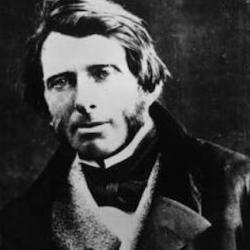In the third volume of Modern Painters, Ruskin addresses the “German dulness, and English affectation” that has “multiplied among us the use of two of the most objectionable words that were ever coined by the troublesomeness of metaphysicians,—namely, ‘Objective,’ and ‘Subjective.'”
The words are “exquisitely . . . useless” and he sincerely to “get them out of my way, and out of my reader’s.”
What he has in mind is a theory of this sort: “The word ‘Blue,’ say certain philosophers, means the sensation of colour which the human eye receives in looking at the open sky, or at a bell gentian. Now, say they farther, as this sensation can only be felt when the eye is turned to the object, and as, therefore, no such sensation is produced by the object when nobody looks at it, therefore the thing, when it is not looked at, is not blue; and thus (say they) there are many qualities of things which depend as much on something else as on themselves. To be sweet, a thing must have a taster; it is only sweet while it is being tasted, and if the tongue had not the capacity of taste, then the sugar would not have the quality of sweetness.”
Thus, “they agree that the qualities of things which thus depend upon our perception of them, and upon our human nature as affected by them, shall be called Subjective; and the qualities of things which they always have, irrespective of any other nature, as roundness or squareness, shall be called Objective.”
It’s an easy step, Ruskin says, to the view that “it does not much matter what things are in themselves, but only what they are to us; and that the only real truth of them is their appearance to, or effect upon, us.” And a philosopher may “with a hearty desire for mystification, and much egotism, selfishness, shallowness, and impertinence,” venture that “everything in the world depends upon his seeing or thinking of it, and that nothing, therefore, exists, but what he sees or thinks of.”
Ruskin’s alternative is to insist that “blue” doesn’t name a sensation but “the power of producing that sensation.” This power remains in the things, whether anyone experiences this power or nor. He find an analogy in gunpowder, which has a power of exploding: “It will not explode if you put no match to it. But it has always the power of so exploding, and is therefore called an explosive compound, which it very positively and assuredly is, whatever philosophy may say to the contrary.”
Similarly, “a gentian does not produce the sensation of blueness, if you don’t look at it. But it has always the power of doing so.” Ultimately, this depends on God: “its particles being everlastingly so arranged by its Maker.” If anyone fails to see blue, then the fault isn’t in the thing or its Maker, but in the observer.
Ruskin ends with some counsel to philosophers: “instead of using the sonorous phrase, ‘It is objectively so,’ you will use the plain old phrase, ‘It is so,’ and if instead of the sonorous phrase, ‘It is subjectively so,’ you will say, in plain old English, ‘It does so,’ or ‘It seems so to me,’ you will, on the whole, be more intelligible to your fellow-creatures; and besides, if you find that a thing which generally ‘does so’ to other people (as a gentian looks blue to most men), does not so to you, on any particular occasion, you will not fall into the impertinence of saying, that the thing is not so, or did not so, but you will say simply (what you will be all the better for speedily finding out), that something is the matter with you. If you find that you cannot explode the gunpowder, you will not declare that all gunpowder is subjective, and all explosion imaginary, but you will simply suspect and declare yourself to be an ill-made match.”











